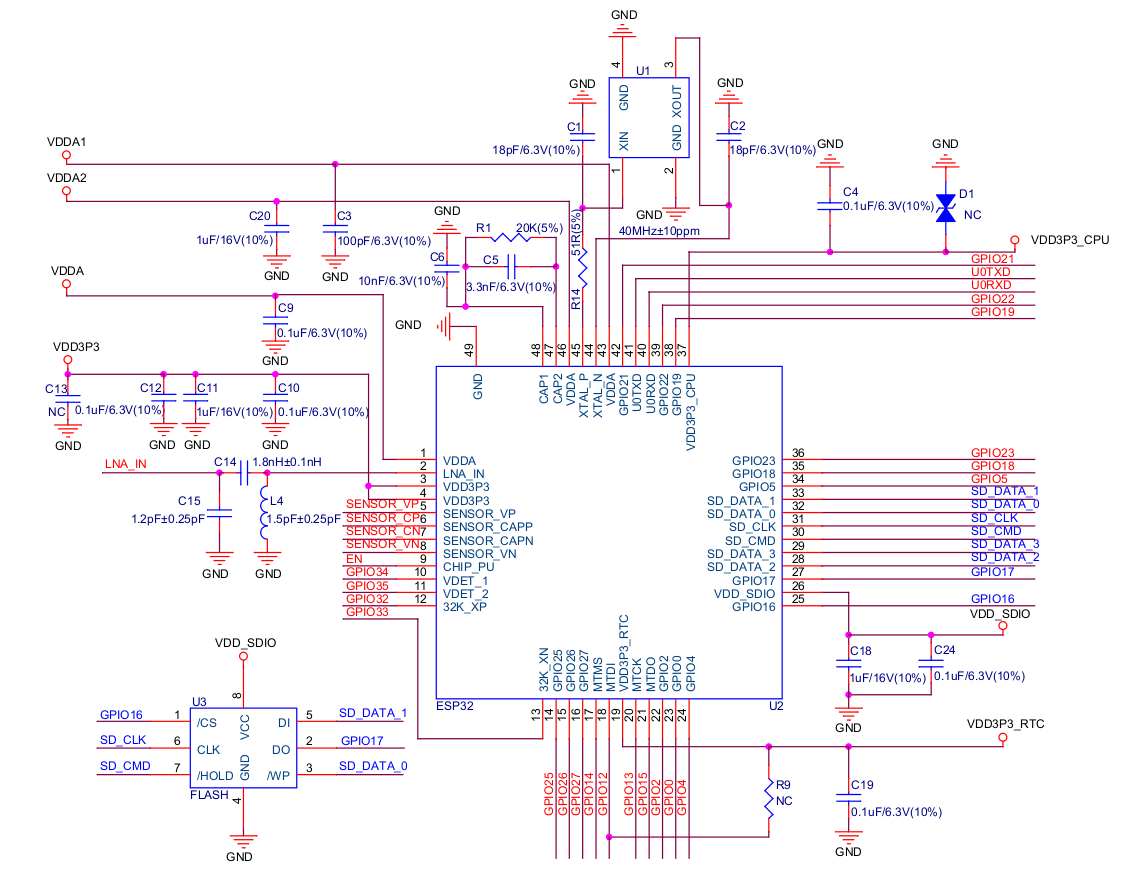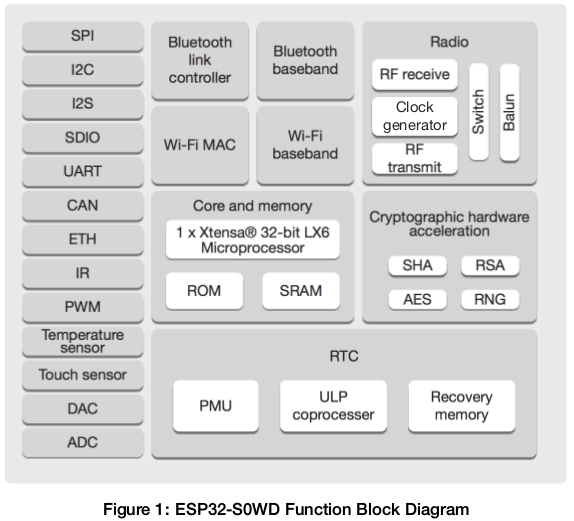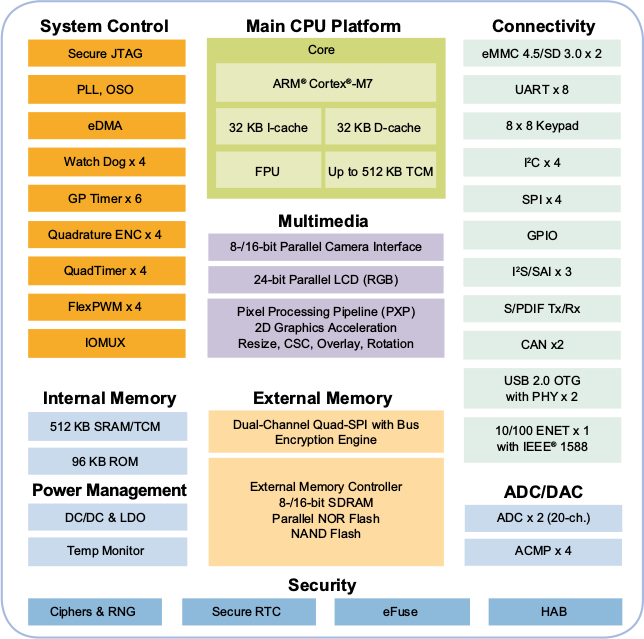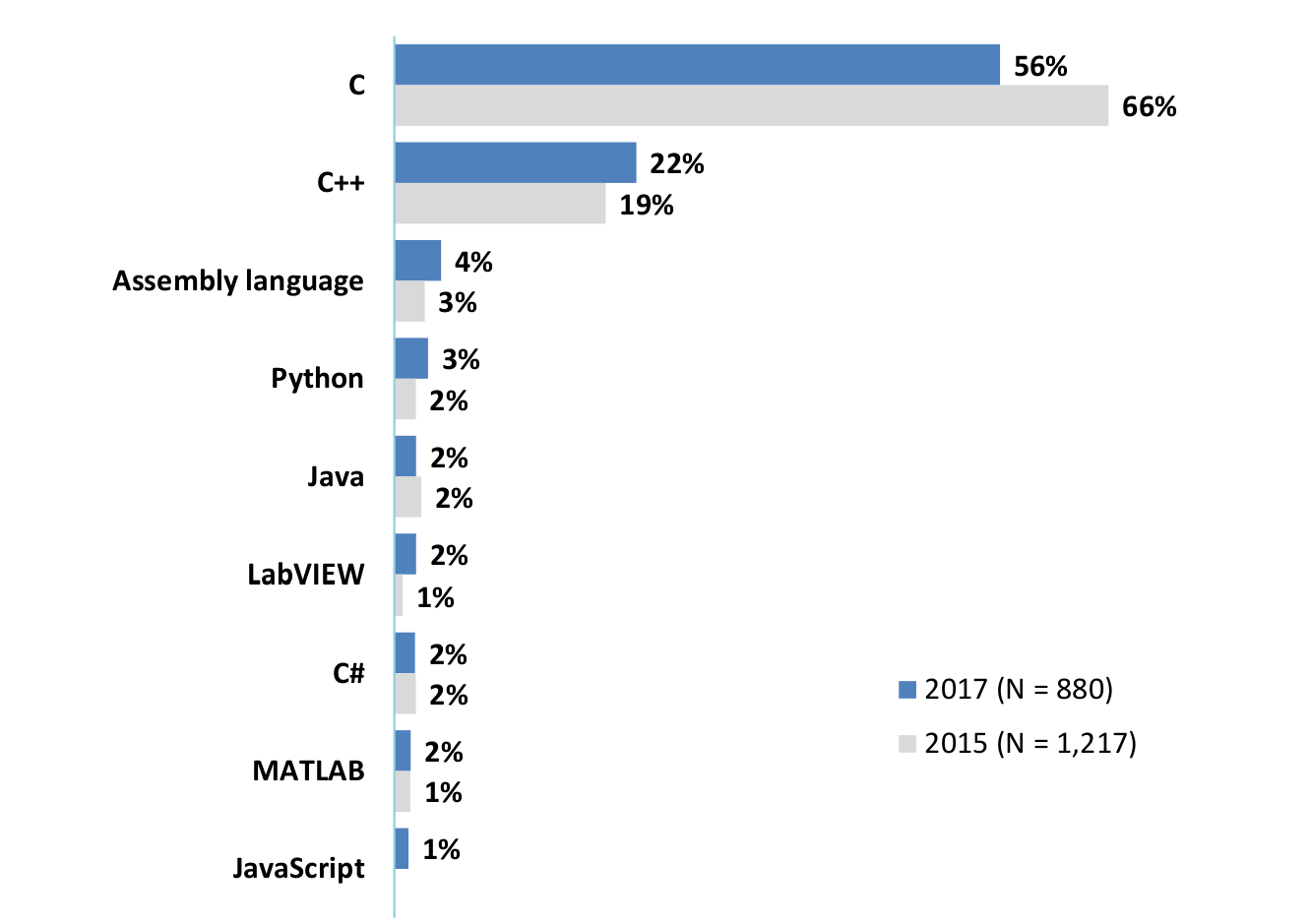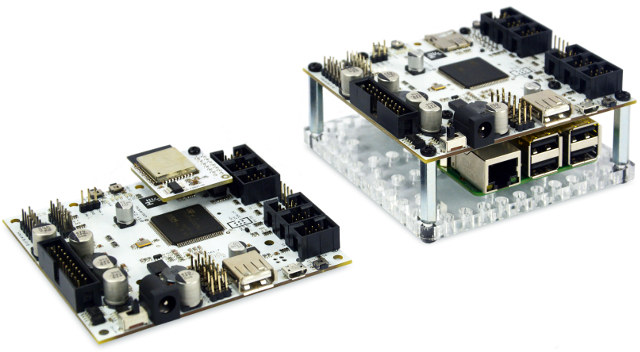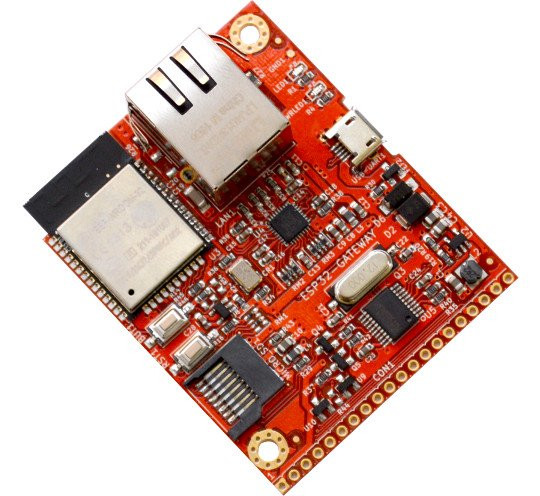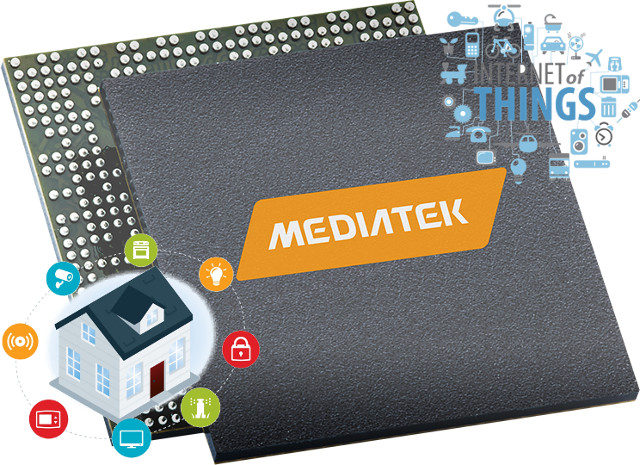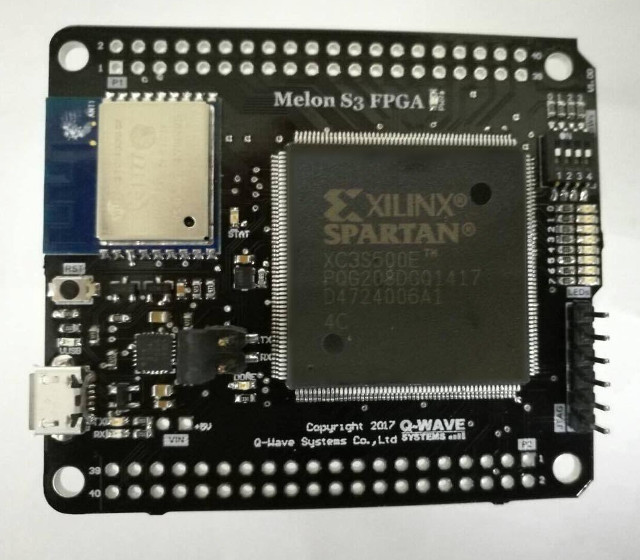Espressif Systems has revealed another ESP32 variant, but this time it’s not an SoC, but a 7x7mm system-in-package (SIP) that comes ESP32 dual core processor, a 4MB SPI flash, a crystal oscillator and various passive components, so that you don’t need to include those in your design, and create an ultra-compact PCB for wearables and other space-constrained applications. ESP32-PICO-D4 SiP specifications: SoC – ESP32 with two Tensilica LX6 cores, 448 KB ROM, 520 KB SRAM (inc. 8KB RTC memory), 1kbit eFuse On-module Flash – 4MB SPI flash Connectivity WiFi – 802.11 b/g/n/e/i (802.11n up to 150 Mbps) Bluetooth – Bluetooth V4.2 BR/EDR and BLE specification; ; class-1, class-2 and class-3 transmitter; Audio: CVSD and SBC SIP Interfaces SD card, UART, SPI, SDIO, LED PWM, Motor PWM, I2S, I2C, IR GPIO, capacitive touch sensor, ADC, DAC, LNA pre-amplifier Sensors – On-chip Hall sensor & temperature sensor Clock – On-module 40 MHz crystal […]
Single Core ESP32-S0WD WiSoC Datasheet and Price
I’m subscribed to Espressif Systems’ notification system so that I received an email each time there’s a documentation update on their website, and this morning they posted ESP32-S0WD Datasheet, the single core version of ESP32 processor, which we reported in our post about ESP32 5×5 packages. Beside the small 5x5mm 48-pin package, and single Xtensa 32-bit LX6 microprocessor, it looks to be the same as the frequently used ESP32-D0WDQ6 with a 6x6mm 48-pin package. The CPU & Memory part of the datasheet reads: ESP32-S0WD: Xtensa single–core 32-bit LX6 microprocessor, up to 200 DMIPS 448 KB ROM 520 KB SRAM 16 KB SRAM in RTC QSPI flash/SRAM, up to 4 x 16 MB Power supply: 2.3V to 3.6V While ESP32 datasheet shows a dual core up to 600 MIPS, so maybe the max frequency is also limited. I could not find any ESP32-S0WD module or board just yet, but GridConnect is […]
NXP i.MX RT Series Crossover Embedded Processor is Based on an ARM Cortex-M7 Core @ 600 MHz
Microcontrollers (MCUs) provide real-time processing, low power, low cost, and plenty of I/Os, but with security and user interface requirements of recent embedded devices, the processing power may be a limitation, and embedded systems designers may have to use an application processor instead gaining performance, but losing some of the benefits of MCUs. The bridge the gap between performance and usability, NXP has launched i.MX RT series of Crossover Embedded Processor which uses the powerful ARM Cortex-M7 MCU core clocked at up to 600 MHz, a frequency partially made possible by eliminating on-chip flash memory. The first member of the family is NXP i.MX RT1050 with the following key features and specifications: MCU Core – ARM Cortex-M7 @ up to 600 MHz; 3015 CoreMark / 1284 DMIPS Memory – Up to 512KB SRAM/TCM (Tighly Coupled Memory) with response time as low as 20 ns Storage – 96KB RAM; interfaces: NAND, […]
Aspencore 2017 Embedded Markets Study – Programming Languages, Operating Systems, MCU Vendors, and More
Aspencore media group asked readers of their EE Times and Embedded.com websites to fill out an online survey about their embedded system projects. They got 1,234 respondents mostly from North America (56.3%), followed by Europe (25.2%), and Asia (10.6%). This resulted in a 102-page market study which you can download here. I’ve extracted a few slides to have a look at some of the trends. C language is still the most used language in embedded systems, but other languages like C++, Python and even assembly language are gaining traction. Operating system is more spread with Linux being the most used via Embedded Linux distributions, Debian, and Ubuntu. FreeRTOS comes in second place, while Android registers fourth with 13%. Git has finally supplanted Subversion in 2017, with all other version control software losing ground. Switching to some hardware slides, 44% used a development board to start their embedded design with ST […]
Husarion CORE2 STM32 Board for Robotics Projects Works with ESP32, Raspberry Pi 3, or ASUS Tinkerboard
Husarion CORE2 is a board designed to make robotics projects simpler and faster to complete with pre-configured software and online management. Projects can start using LEGOs, before moving to 3D printed or laser-cut version of the mechanical parts without having to spend too much time on the electronics and software part of the project. Two versions of the board are available: CORE2 combining STM32 MCU with ESP32 WiFI & Bluetooth module, and CORE2-ROS with STM32 instead coupled to a Raspberry Pi 3 or ASUS Tinkerboard running ROS (Robot Operating System). Both solutions share most of the same specifications: MCU -STMicro STM32F4 ARM CORTEX-M4 MCU @ 168 MHz with 192 kB RAM, 1 MB Flash External Storage – 1x micro SD slot USB – 1x USB 2.0 host port with 1A charging capability; 1x micro USB port for debugging and programming via FTDI chip Expansion Headers hRPi expansion header for CORE2-ROS […]
Olimex Launches 22 Euros ESP32-GATEWAY Board with Ethernet, WiFi and Bluetooth LE
Olimex has just launched ESP32-GATEWAY board, as cost-down version of their ESP32-EVB board, still with Ethernet, WiFi, and Bleutooth LE, but without any relays, CAN bus, nor IR control, less I/Os, and a smaller footprint. Olimex ESP32-GATEWAY specifications: Wireless Module – ESP32-WROOM32 module with 802.11 b/g/n WiFi and Bluetooth LE Wired Connectivity – 10/100M Ethernet with RJ45 jack (via LAN8710A) External Storage – micro SD slot Expansion – 20-pin GPIO connector USB – 1x micro USB port for debugging (CH340T) and power Misc – Reset and user buttons Power Supply – 5V via micro USB port Dimensions – 62 x 50 mm Another change is the lack of a LiPo charger to run the board from batteries. Just like most Olimex boards, ESP32-GATEWAY is open source hardware with KiCAD design files available on Github. The software directory is still empty, but Ethernet demo code using ESP32-IDF has been pushed for […]
MediaTek Unveils MT7686, MT7682, and MT5932 WiFi SoCs for IoT and Smart Home Applications
Beside announcing MT7622 SoC for WiFi and Bluetooth 5 gateways and routers last week, Mediatek also introduced three “next generation” WiFi SoCs for the IoT and the Smart Home market during Computex 2017, namely MT7686, MT7682, and MT5932. Mediatek MT7686 is a wide temperature range WiFi SoC for appliances: MCU – ARM Cortex-M4F @ 192 MHz System Memory – 4MB + 384KB RAM Storage – 4 MB flash with XIP support Connectivity – Low-power 1T1R 802.11 b/g/n Wi-Fi subsystem Peripherals – SDIO I/F, UART, I2C, SPI, I2S, PWM, and auxiliary ADC Power Supply – Integrated Power Management Unit (PMU) Power Consumption – Connected DTIM1 <0.7mA Temperature Range – “Wide” Package – QFN48 (6x6mm) Mediatek MT7682 is promoted as a cost-effective, integrated SoC for multi-Cloud platforms: MCU – ARM Cortex-M4F @ 192 MHz System Memory – 384KB RAM Storage – 512 KB or 1 MB flash with XIP support Connectivity – […]
Melon S3 FPGA Arduino & Raspberry Pi Compatible Board is Programmable over WiFi using ESP8266 WiSoC
Q-Wave Systems, an embedded systems company based in Thailand, has designed Melon S3 FPGA board powered by a Xilinx Spartan 3E FPGA with WiFi connectivity added through a ESP8266 module programmable with the Arduino IDE , and featuring two Raspberry Pi compatible headers. The FPGA bitstream can be updated over WiFi, and does not require a JTAG debugger. Melon S3 FPGA specifications: FPGA – Xilinx Spartan XC3S500E FPGA with 500K gates, 73Kb Distributed RAM, 4 Digital Clock Manager (DCM), 20 Multipliers (18×18), 360 Kb Block RAM WiFi module – WROOM-2 with Espressif ESP8266 32-bit MCU @ 80 MHz supporting 802.11 b/g/n WiFi. Storage – 4MB SPI flash in total with 1MB for ESP8266, 3 MB for FPGA Expansion – 2x 40-pin Raspberry Pi compatible headers; 3.3V tolerant Debugging – Onboard USB-UART Silicon Labs CP2104 for configuration, debugging and power; 6-pin JTAG port for debugging/programming Misc – 8x Users LEDs, 4x […]


